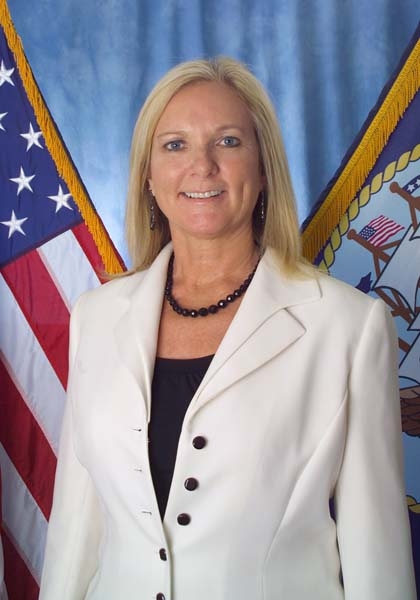How I Lead: Mentoring Those Who Will Someday Take Charge
Insights from Dora Quinlan, a senior executive at the Navy’s Fleet Readiness Center Southeast.
Dora Quinlan is the business operations director at Fleet Readiness Center Southeast in Florida. The center is the largest tenant command at Naval Air Station Jacksonville and the largest industrial employer in Northeast Florida and Southeast Georgia. The diverse and highly skilled workforce maintains some of the most sophisticated and complex aircraft in the military’s inventory. Quinlan is responsible for coordinating the development and implementation of the center’s long-range business strategy.
What is the most important thing you have learned in your career?
Never forget where you came from and the people who helped you along the way. I started my career as a GS-3 clerk typist. I know what it takes to get from the bottom rung of the career ladder to the top. As a senior leader, I not only have to perform well at my daily duties, but I also have a responsibility to mentor those top performers who may someday lead in my place. I will never forget the challenges, roadblocks and awesome opportunities I have experienced during my 37-year civil service career. Job experience, integrity, confidence, teamwork, leadership, work life balance and a good sense of humor are some lessons and tools I have learned throughout my career, and it is my responsibility to pass on that knowledge.
What is your strategy for interactions with your supervisor?
When interacting with your supervisor, always be prepared. They are depending on you to know your job and contribute to the mission. If you are presenting a problem to your boss, you should also be prepared to offer alternative solutions. This is also an opportunity to demonstrate your ingenuity at attempting to resolve the issue, vice adding another problem for your boss to solve. Every interaction with your boss is an opportunity to display your talents.
What career accomplishment are you most proud of?
I received the first-ever Naval Air Systems Command Mentor of the Year Award. I am very passionate and proud of my work, especially in educating people about Fleet Readiness Center Southeast and its mission of delivering high quality products and services to the warfighting customer. I was proud to receive this award because it gives credence to the value of mentoring and raises the awareness of its importance.
What is the best leadership lesson you've learned?
I learned that an effective leader not only cares about the business, but also about the well-being of employees. Employees want to know that management cares about them. Leaders need to recognize and reward the efforts of their top performers and publicly acknowledge their contributions. Make no mistake, employees are watching the way leaders conduct their daily business, pursue professional development, interact with the workforce, and balance work and family. You must lead by example.
How did you get to where you are today?
I set career and educational goals and worked tirelessly to achieve them. I was willing to take on any new assignment or challenge to demonstrate my willingness to be a team player and to lend my talents and expertise. I strongly recommend finding mentors and joining professional associations such as Young Government Leaders, the Federal Managers Association, etc. Throughout my career, many influential people took the time to serve as my mentor, for which I am grateful. I also joined various professional associations, such as the Federal Managers Association, that offered me numerous training and networking opportunities.
What leadership lessons do you try to convey to your team?

I emphasize the importance of strong ethical judgment, honesty, integrity and respect. When I have to make decisions, I communicate directly with the workforce. This is especially important when making the tough and potentially unpopular decisions. While not everyone may agree with my decision, I clearly communicate the factors that led to it. I also continue to work on my professional development to demonstrate to my team that continuous learning will make you a stronger leader.
What do you look for in potential employees when making hiring decisions?
Experience and education are important in any hiring decision. However, I also consider a person’s core values. Does the individual exhibit integrity, courage, confidence, teaming and commitment traits? It is important to understand each person's strengths and weaknesses, and place them in a position where they can succeed. I am a firm believer in the value of diversity in the workforce. Your job as a leader is to understand the value of each person's unique characteristics and utilize those differences to optimize their personal performance and that of the organization.
What do you do after work for fun or to relax?
I love outdoor activities, such as hiking, biking, kayaking and fishing, which is one of the reasons I decided to relocate to sunny Florida. I also enjoy listening to music and dancing. Some relaxing activities include reading, massage, meditation and prayer. But most important, I love spending time with my family and friends.
What is the best mistake you've ever made?
Early in my career, I was too focused on a specific career path. By not considering other professional fields, I was limiting my career potential. When I participated in the NAVAIR Senior Executive Management Development Program, I was afforded the opportunity to work in other career fields, which opened my eyes to many possibilities. I strongly advise employees to consider job rotation opportunities to diversify their resume.
In high school, I would have been voted "Most likely to ______"
I actually used social media to ask some of my former high school classmates to fill in the blank. I jokingly said “be a rock band roadie” was already taken. Some examples of their responses were 1) best example of womanhood that you could find, 2) live life to the fullest, 3) be a great friend, mentor and leader and 4) be there for family and friends. I was humbled by their responses. I think most human beings tend to be too critical of themselves.
How do you involve your employees to ensure everyone is on board with a new idea?
How you communicate and present a new idea is key. Delivering a clear message along with soliciting feedback from the team is also important. Once I have delivered my message, I listen. I cannot overemphasize the importance of listening to your employees. If you keep an open mind and seek to understand every employee’s point of view, you may find a different perspective to consider that you may have overlooked.
What was the biggest career risk you took?
My biggest career risk was leaving Naval Air Systems Command at Naval Air Station Patuxent River, Maryland. NAVAIR is a headquarters command, and I made the decision to accept a job as a business financial manager at a field activity. Most people would view that career move as going backwards. The move to Jacksonville turned out to be a great decision for my family and me. I gained a greater awareness and understanding of the work performed at the industrial site. While working at NAVAIR, I felt confident that I understood the complexities of running all of the depot locations throughout the country, but of course my eyes were opened as to how decisions made at headquarters impacted field activities. I learned that decisions must be carefully evaluated and that all stakeholders must have input in the decision-making process.
NEXT STORY: Commentary: Poor Morale Should Not Be Ignored








